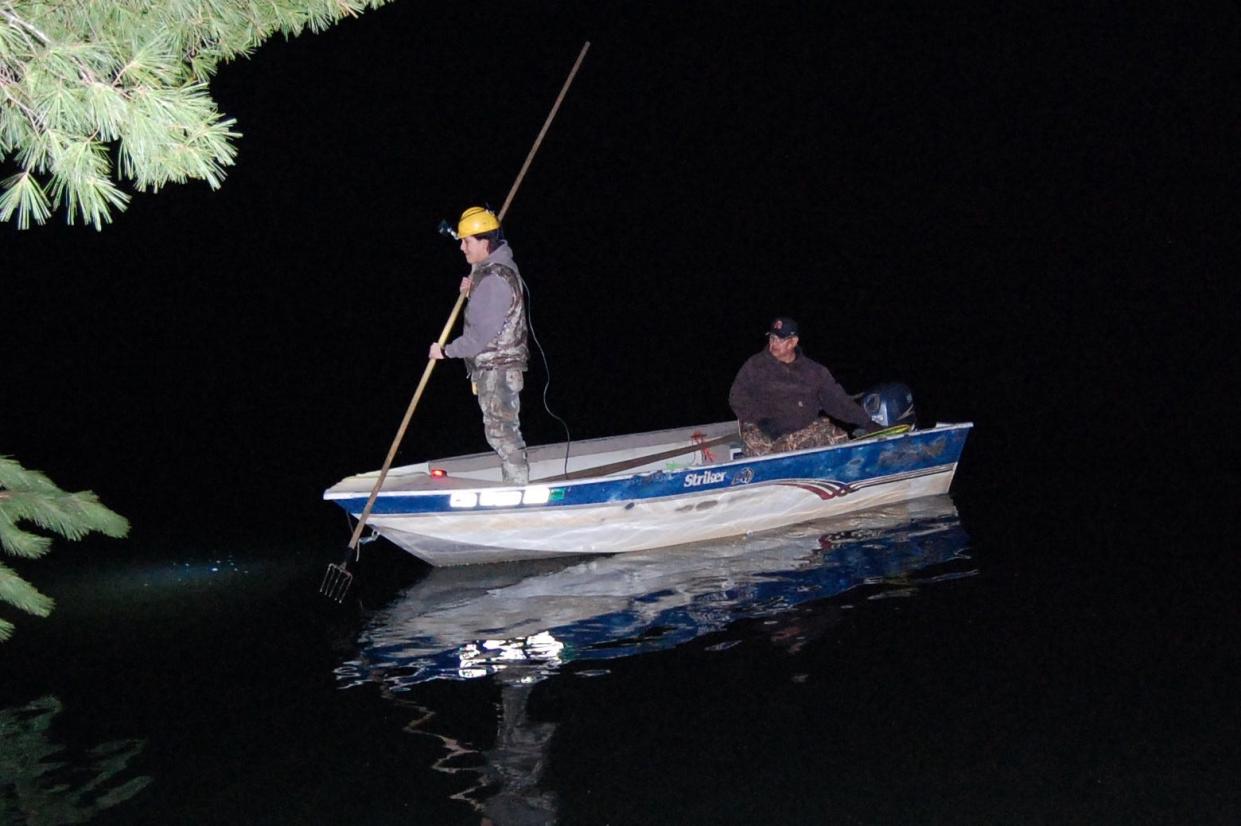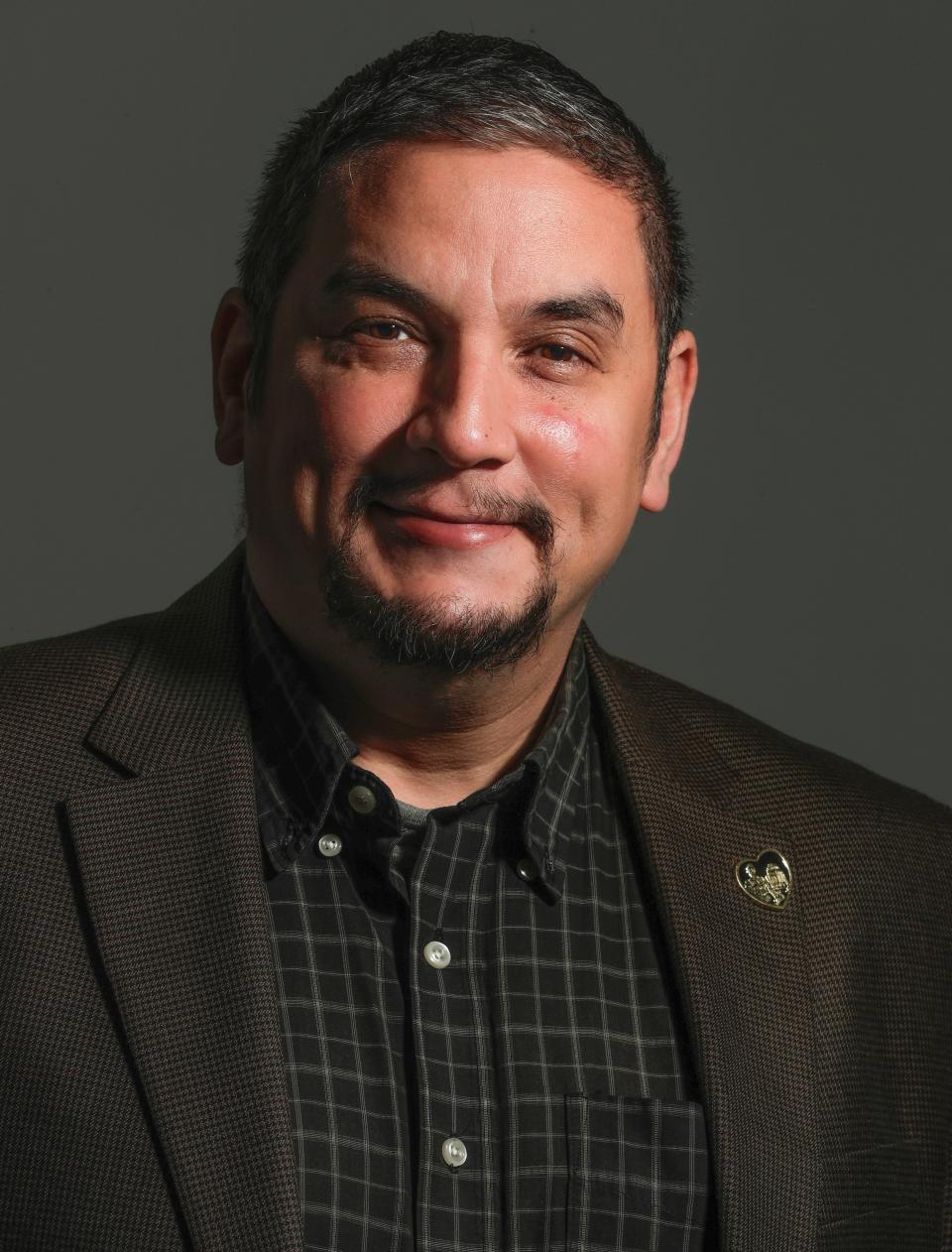As tribal spearfishing season begins in northern Wisconsin, officials say they have 'zero tolerance' for harassment

Tribal and state officials are warning against harassment of spearfishers as the Indigenous harvest season starts in northern Wisconsin.
“Tribal members have the right to hunt, fish and gather in the Ceded Territories,” said Wisconsin Attorney General Josh Kaul in a statement. “Any attempt to interfere with those rights is illegal and should be reported to local law enforcement and Great Lakes Indian Fish and Wildlife Commission.”
Preston D. Cole, secretary for the Wisconsin Department of Natural Resources, also released a statement.
“The department has zero tolerance for harassment of tribal members who are exercising their treaty rights,” he said in a statement. “We fully support Ojibwe sovereignty and treaty rights.”
Officials with the Great Lakes Indian Fish and Wildlife Commission are urging tribal citizens to remember and practice the four C’s should they encounter any harassment. Those are to create distance, confirm their location, call 911 and check in with GLIFWC.
RELATED: Wisconsin Ojibwe tribal citizens say they were harassed while spearfishing in Minnesota
Tribal officials said incidents of harassment of spearfishers occur every season, yet many go unreported.
Last year, a Lac du Flambeau Ojibwe family reported they were harassed while spearfishing on Mille Lacs Lake in the Ceded Territory in Minnesota.
Melvin Buckholtz told police he and his family, which included his 13-year-old son, were confronted by a group of people on shore who were yelling profanities, throwing rocks at them and threatening gun violence.
Last month, charges were brought against Colin James Louvar, 23, in connection with the incident. The charges include felony harassment with aggravated violations for screaming racially-charged profanities at Buckholtz’s family.
In 2020, Greg (Biskakone) Johnson, a Lac du Flambeau Ojibwe citizen, reported gunfire in his direction after a confrontation with a man on shore while he and a group of others were spearfishing in northern Wisconsin.
James Kelsey, 62, pleaded no contest to using a gun while intoxicated and served no jail time, but was instead ordered by a Vilas County judge to pay a $343.50 fine earlier this year, to the ire and frustration of tribal citizens and their supporters.
Vilas County District Attorney Martha Milanowski said hate crime and use of a dangerous weapon charge modifiers were dropped because Kelsey pleaded no contest to possessing a firearm while intoxicated and interfering with tribal fishing rights, which is a DNR ordinance violation.
The rights for Ojibwe people to hunt and fish off-reservation in what is known as the Ceded Territory, which includes much of the Wisconsin Northwoods, are guaranteed by U.S. and tribal law through early to mid-19th century treaties in exchange for the government taking Ojibwe land.
Those opposed to spearfishing argue it harms the fish populations, but state officials say that’s not true.
The DNR sets safe harvest amounts for each lake so there is less than a 1-in-40 chance that more than 35% of the adult walleye population will be harvested by tribal and recreational fishermen combined.
“Some people say an extra harvest is given to tribal members, which is not true,” said Todd Ambs, former assistant deputy secretary of the DNR, adding that there about 500 tribal spearers compared with about 2 million licensed anglers in the state. “Other (non-tribal) anglers have harvested substantially more.”
Since 1989, the total tribal harvest of walleye in the Ceded Territory averaged about 28,000 per year, according to a joint tribal, state and federal report.
Tribal fisheries on reservations more than replenish those numbers every year.
These hatcheries produced more than 15 million walleye eggs in 2018, of which more than 121,000 reached to extended growth fingerlings and were released into Northwoods lakes.

Sign up for the First Nations Wisconsin newsletter Click here to get all of our Indigenous news coverage right in your inbox
Tribal officials reported that these hatcheries help replenish declining fish populations that may be caused by warming waters, shoreline development and invasive species.
Anyone violating tribal rights could be charged under several Wisconsin laws, fined up to $10,000 and sentenced up to nine months in prison, according to the Department of Justice.
Additionally, any tribal member whose rights are violated may bring civil action for damages and seek a restraining order.
“The spring treaty fishing season is among the most highly regulated, highly enforced harvest activities in the region,” McGeshick said in a statement. “Overall, GLIFWC’s Conservation Law Enforcement Division maintains excellent working relationships with law enforcement agencies throughout the Ceded Territories. Together, we hope to help create an atmosphere where tribal members can fish, hunt, and gather without worry or apprehension.”
Frank Vaisvilas is a Report For America corps member based at the Green Bay Press-Gazette covering Native American issues in Wisconsin. He can be reached at 920-228-0437 or fvaisvilas@gannett.com, or on Twitter at @vaisvilas_frank. Please consider supporting journalism that informs our democracy with a tax-deductible gift to this reporting effort at GreenBayPressGazette.com/RFA.
This article originally appeared on Green Bay Press-Gazette: Tribal spearfishing starts in Wisconsin; harassment won't be tolerated

